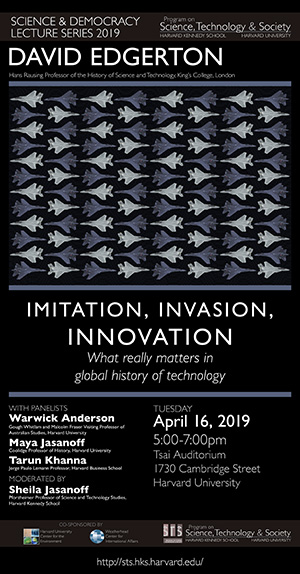Program on Science, Technology and Society at HarvardHarvard Kennedy School of Government | Harvard University |
|||||||
|
|
Imitation, Invasion, Innovation: What really matters in global history of technologyDavid EdgertonHans Rausing Professor of the History of Science and Technology, King’s College London April 16, 2019, 5:00-7:00pm AbstractIn the last twenty or thirty years innovation has been central to the discourse on the economy. This ‘innovation’ is disruptive, pervasive and fast, demanding new economic, political and social forms. On the other hand, the world has seen unprecedented rates of imitation, not least of old forms. In our imaginations innovation and imitation occupy different geographical, economic and moral spaces. Innovation is seen positively and futuristically, as a feature of a few selected, creative, entrepreneurial places; it marches with time. Imitation is seen in more hard-headed, economic ways; as a feature of developing countries, as a sign of imaginative inadequacy, and lack of authenticity; it moves with incomes not time. Breaking down these oppositions and taking imitation seriously is the key to understanding global technical change in the twentieth century. Video available here. PanelWarwick AndersonGough Whitlam and Malcolm Fraser Visiting Professor of Australian Studies, Department of the History of Science, Harvard University Maya JasanoffCoolidge Professor of History, Department of History, Harvard University Tarun KhannaJorge Paulo Lemann Professor, Harvard Business School Moderated bySheila JasanoffPforzheimer Professor of Science and Technology Studies, Harvard Kennedy School About the speakerDavid Edgerton is the Hans Rausing Professor of the History of Science and Technology and Professor of Modern British History at King’s College London. A historian of science and technology and of twentieth-century Britain, he taught at the University of Manchester before becoming founding director of the Centre for the History of Science, Technology and Medicine at Imperial College London (1993-2003). He was a Leverhulme Trust Major Research Fellow (2006-2009), and gave the 2009 Wilkins-Bernal-Medawar Prize Lecture at the Royal Society of London. In 2013, he moved to King’s, where he chairs King’s Contemporary British History and is a co-director of the Sir Michael Howard Centre for the History of War. He has appeared in many radio and TV programs and regularly gives talks to official and public bodies on a wide range of topics. He was educated at St. John’s College Oxford and Imperial College London. His many books include: Science, Technology and the British Industrial ‘Decline’, 1870-1970 (1996); Warfare State: Britain, 1920-1970 (2005); The Shock of the Old: Technology and Global History since 1900 (2006); Britain’s War Machine: Weapons, Resources and Experts in the Second World War (2011); and The Rise and Fall of the British Nation: A Twentieth Century History (2018). Co-sponsored by the Harvard University Center for the Environment and the Weatherhead Center for International Affairs. |
||||||
